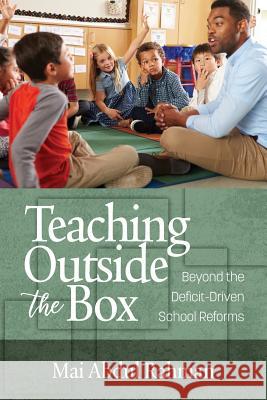Teaching Outside the Box: Beyond the Deficit Driven School Reforms » książka
Teaching Outside the Box: Beyond the Deficit Driven School Reforms
ISBN-13: 9781641133784 / Angielski / Miękka / 2018 / 254 str.
Teaching Outside the Box: Beyond the Deficit Driven School Reforms
ISBN-13: 9781641133784 / Angielski / Miękka / 2018 / 254 str.
(netto: 218,25 VAT: 5%)
Najniższa cena z 30 dni: 228,69
ok. 30 dni roboczych
Dostawa w 2026 r.
Darmowa dostawa!
In its totality, this book explores subjects that are rarely available in primary literature publications and brings diverging fields together that are generally addressed separately in specialty journals. The book argues that past school failures are instructive. The author identifies the structural and emotional triggers that make it difficult for educators' to overcome the social constructs that control the progress of Black students, reproduce inequities, subvert the socio-economic progress of the nation, and threaten the legitimacy of the U.S. public school system. One failure is informative; successive school failures are chock-full of must avoid school policies and instructional practices. The book analyzes the lessons learned from a list of school-imposed policies that have molded and determined the academic progress of Black students. The author argues that much can be discerned from that which undermined the performance of schoolteachers' and public school systems. The quantifiable outcomes of past school practices can better inform educators and future teachers and school leaders. The book carefully analyzes the organic evolution of educators' social constructs that regenerated inequities to reveal the road map for rebuilding genuinely inclusive and equitable public school systems that serve the interests of students and society. The book also provides in-depth analysis of various disciplines that identify the best methodologies to improve the teaching and learning of Black students, homeless students, and all other students. The book aims to offer a unique perspective by carefully unfolding the built in school structures that obstruct the abilities of school administrators and teachers to bridge the student achievement gaps and meet the objectives of consecutive school reform initiatives. The author's distinctive approach stimulates the thinking of the entire field of education, and challenges accepted propositions commonly assumed about African American students. In short, this book offers a perspective that is rarely shared or understood by educators and practitioners in the field of education.











